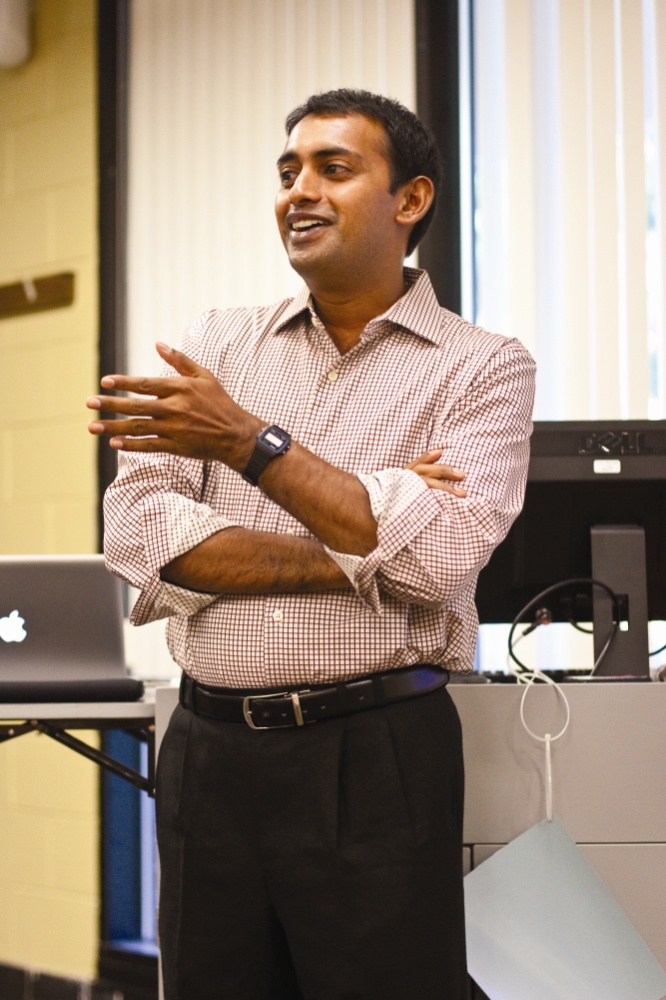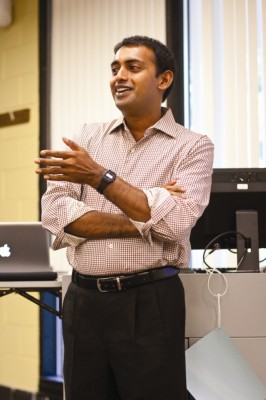
Ashok Gladston Xavier brought a heart-wrenching documentary film with him when he returned for a brief visit to EMU on June 30, 2011.
Shown to about 50 of his old friends and colleagues at the EMU library, the film told of terrorized women living in Khandamal, a small district of Orissa, a state in the eastern part of India. These women were part of a minority group – in this case Christian – violently victimized by mobs from the surrounding majority-Hindu group.
From Ashok’s perspective, the nature of the minority status in this case is less significant than the reality that all minorities tend to be highly vulnerable to persecution by majorities, unless a culture of tolerance, mutual respect and reconciliation is fostered.
“I’ve worked a lot in Sri Lanka, and there the Sinhalese majority group is Buddhist and the minority group is the Tamil-speaking, who are mostly Hindu and Muslim,” says Ashok. “Regardless of the groups involved in the struggle, the fundamental issue is that everyone deserves the same basic rights of shelter, food, clothing, a means to make a living, and freedom to worship as they see fit.”
Ashok and his wife, Florina Immaculate Mary Benoit, often work as a team traveling to hot spots upon request for trainings in conflict transformation and trauma healing, usually over weekends. During the week, both of them hold demanding jobs in southern India – Florina does operations capacity-building for a refugee self-help organization and Ashok is professor of social work at a major university. Both of them earned PhDs in India after completing their master’s degrees at CJP in 2004 as Fulbright scholars.
“The first question I always ask when I go into a situation is, ‘What happened?’ and then I always hear two different stories, depending on which ‘side’ I am speaking to,” said Ashok. “Then I say, ‘Well, let’s put parts of these stories together and see if we can answer the next questions, Who has been affected by this event? What are the violations and what are the needs? Can we take joint responsibility to address these needs?’
“Answering these questions takes days, of course, of people talking in settings, with facilitators, where they feel safe and can be honest and vulnerable,” Ashok told Peacebuilder. “We have to start with conversations and move to relationship-building to emerge from the trauma cycle of victimization, vengeance and re-victimization.”
In the past year, Ashok has focused intently on helping to alleviate the suffering – and break the cyclical violence – experienced by impoverished Christian citizens living in Khandamal. Over a period of 300 days, 50,000 of them were displaced from their homes and several of their villages were reduced to ashes. And it all could be traced to a misunderstanding about the killing of a popular Hindu swami. Local followers of the swami blamed Christians, but Ashok said actually a Maoist group admitted responsibility for the killing. “My goal is to help the people of this region to create what I think everyone wants, deep in their hearts – a just and peaceful society,” says Ashok.
In one part of Sri Lanka, Ashok and Florina have assisted the people in post-war reconstruction, using development as a tool for building peace. They facilitated a “peace dialogue,” which enabled community members who had been avoiding each other to begin to interact.
Two years later in this community, when a terrorist incident caused the Sinhalese-dominated military to sweep through the homes of Tamils, Ashok says the local Sinhalese gave shelter to their Tamil neighbors and told the military, “If you want to take them, you’ll have to take us first.”
